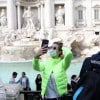Analysis | The Technology 202: Ro Khanna wants to counter Trump’s MAGA message with a high-tech jobs boom – The Washington Post

U.S. Rep. Ro Khanna (D-Calif.) speaks with Sen. Bernie Sanders (I-Vt.) before Sanders takes to the stage at his rally. (Photo by Nick Otto for The Washington Post)
Ctrl + N
Democratic presidential candidates didn’t talk about high-tech jobs onstage during last night’s chaotic debate. Rep. Ro Khanna (D-Calif.) would call that a missed opportunity.
The congressman who represents Silicon Valley wants his party to counter Trump’s “Make America Great Again” message with an ambitious pitch to bring modern jobs to heartland cities and rural areas that have been left behind in the recent tech boom.
“Trump’s telling these folks he’s going to bring them back to the past,” Khanna said in an interview yesterday ahead of the Democratic primary debate in South Carolina. “That’s not a realistic vision. But what they sense is, ‘At least Trump understands our anxiety, and he’s speaking to us and he cares.’ And I think what we have to say is, ‘We understand your anxiety and appreciate it, too.’”
It’s unlikely Khanna’s proposal for a new jobs package — a $900 billion plan to jump-start new tech hubs through federal research and development and a nationwide expansion of computer science education – will move through a gridlocked Congress, given its hefty price tag.
But the big-picture message of investing in tech and other innovation in the heartland is timely as Democrats seek ways to win battleground states they ceded to Trump with razor-thin margins in 2016, such as Michigan, Wisconsin and Pennsylvania.
As Democrats more broadly continue their attacks on Big Tech, this proposal is one that’s likely to appeal to companies as well.
Start-ups are struggling to keep up with the high cost of living and competition for salaries in the Bay Area. Even large tech companies such as Amazon and Apple have sought to expand outside of major tech hubs such as San Francisco and Seattle as costs soar.
Khanna thinks the main barrier holding companies back from expanding to smaller cities or rural areas is a lack of talent that’s ready and able to serve a company’s needs.
“These companies should expand their imagination about where they can look,” he said. “But we have to, as a government at the state and federal level, provide investments in collaboration with private sector and the workforce that will that will attract them.”
The most high-profile example was Amazon’s HQ2 contest, the e-commerce giant’s search for a second headquarters location. The company ultimately decided to open its second headquarters in Northern Virginia, after the state showered it with tax incentives. Amazon pulled back on plans to split HQ2 between Virginia and New York, following broad backlash in the latter state to giving the tech giant big tax incentives.
But Khanna says it was a “missed opportunity” for the company not to go with a location in a more rural area or with a more diverse population.
“Imagine if they put that in Nebraska or in parts of Mississippi,” Khanna said.” They would say, well, this is very difficult because the infrastructure of the workplace isn’t there. But maybe they could partner with the state and federal government to help create that workforce.” (Amazon chief executive Jeff Bezos also owns The Washington Post).
As the New York debacle over HQ2 underscored, there’s some resistance to giving rich tech companies major incentives funded by taxpayers for expansions. But Khanna says the Democrats’ pitch can’t just be about expanding traditional software development jobs throughout the country – it has to be regionally specific. He said that could mean investing in advanced manufacturing in Youngstown, Ohio, or “Timber 2.0” in Spokane, Washington.
“The idea of plopping Silicon Valley everywhere, which is kind of I think how it gets caricatured that everyone should be a coder, is not is not the vision of how do we prepare America for a 21st century economy,” he said.
Khanna’s plan would also establish a Federal Institute of Technology, which would be tasked with promoting breakthrough science. The FIT would be responsible for picking the tech hubs, through an open competition. The goal is to establish 30 such hubs around the country over a ten-year period. Funding would be dedicated to research and development in areas such as artificial intelligence, computer hardware, advanced manufacturing and climate-related technologies.
His proposal would also effectively require computer science to be part of the base curriculum for students in grades K through 12 nationwide. It would make it a subject for which states are required to create standards, as is the case now with reading, mathematics and science.
His plan also includes tax incentives for companies to hire disadvantaged rural and minority workers.
Khanna says that this level of investment is not needed just to expand access to modern jobs throughout the country, but also to keep pace with rivals. He says a $900 billion investment over ten years would raise total public R & D spending to 1 percent of gross domestic product by the end of the period.
“In the Cold War was 3 percent,” he said. “So if we want to stay ahead of China, we need to be winning in these new technologies.”
RANTS AND RAVES
Last night Twitter partnered with CBS News to livestream the Democratic Debate in South Carolina. The evening was full of people talking over one another and jabs about Russian interference. In other words – it was the perfect debate for Twitter to sponsor.
CNN’s Oliver Darcy:
The New York Times’ Charlie Warzel called it “perfect.”
My colleague Tony Romm thought candidates should have leaned into Twitter memes even more.
Journalists also criticized debate moderators for not sourcing more of their questions from Twitter users. The Verge’s Makena Kelly wrote:
BITS, NIBBLES AND BYTES

Employees with Instacart fulfill orders for delivery. (Patrick T. Fallon/Bloomberg News)
BITS: A San Diego judge ruled that Instacart misclassified tens of thousands of its California workers as independent contractors. The ruling is the first major win for gig workers under a new California law that imposes stricter criteria for how companies classify gig workers, Lauren Kaori Gurley at Vice reports.
The ruling will only cover Instacart workers in San Diego, but it could set a precedent for enforcement actions elsewhere in California.
Gig workers have increasingly turned to the courts as they say California regulators continue to fail to enforce the law since it went into effect on Jan. 1. Ride-share drivers for Uber and Lyft in Los Angeles, San Diego and San Francisco filed claims for millions of dollars in lost wages and expenses in protest of the companies’ labor practices earlier this month. The San Diego case was brought by the city attorney in September.
Companies including Uber, Lyft and Postmates are funding a ballot initiative to overturn the law, which they argue doesn’t apply to their workers. Instacart plans to dispute the ruling. “We disagree with the judge’s decision to grant a preliminary injunction against Instacart in San Diego,” Instacart told Lauren.
Instacart workers who have protested the company’s policies celebrated the win.
“Treating us independent contractors has just been an excuse for tech companies to get away with treating us poorly,” Sarah Clarke, an Instantcart shopper who helped lead a nationwide strike for the app workers in November, told Lauren. “Basically, this is a huge step in the right direction.”

The aftermath of a Tesla electric SUV crash into a barrier on U.S. Highway 101 in Mountain View, Calif. (KTVU-TV/AP)
NIBBLES: Investigators probing a fatal 2018 Tesla crash said yesterday that federal regulators displayed a “lack of leadership” in addressing safety problems with partly automated vehicles, my colleague Michael Laris reports.
A “lack of system safeguards to prevent foreseeable misuses of technology,” factored into the tragic collision that killed the driver, National Transportation Safety Board Chairman Robert L. Sumwalt III said at a hearing on the incident yesterday.
The National Highway Traffic Safety Administration has numerous open investigations into Tesla vehicles, but the regulator has been “misguided, because it essentially relies on waiting for problems to occur rather than addressing safety issues proactively,” NTSB officials concluded in their ruling on the accident.
The agency concluded both the driver and car contributed to the fatal crash, potentially putting more pressure on Tesla to fix unaddressed safety concerns of regulators. The company ignored earlier recommendations that it should restrict use of Autopilot to the particular conditions it is designed to handle, investigators said.
NTSB called on NHTSA to evaluate whether Tesla’s partly automated systems “pose an unreasonable risk to safety” and, if so, require Tesla to take corrective action.

A pedestrian wearing a protective face mask takes a selfie at the Trevi Fountain in Rome. (Alessia Pierdomenico/Bloomberg News)
BYTES: Amazon is cracking down on sellers it thinks are using fear surrounding the coronavirus to gouge prices on protective masks, Louise Matsakis at Wired reports. Supply shortages and panic induced by the global health crisis are trickling into the supply chain of one of the world’s biggest online retailers.
The company is alerting sellers that are “not in compliance” and deleting listings that are overpriced, Louise reports. Prices for the most popular brands quadrupled or even quintupled since last month.
“This is a hard one for Amazon, because they do not want its customers to be taken advantage of,” Ed Rosenberg, a consultant who also runs a support group for Amazon sellers, told Louise. “But there is also supply and demand, and sellers should be able to charge more if they pay more and demand is high.” The Covid-19 disease has significantly hit China, a major hub for manufacturing products sold on Amazon.
Amazon has also cracked down on products making fake claims about coronavirus, a problem that could escalate as the disease continues to spread globally.
PUBLIC CLOUD
— News from the public sector:
Twitter falling short on pledge to verify primary candidates
Twitter has pledged to proactively verify new candidates’ accounts this election cycle, but an analysis by The Hill shows that effort falling short.
The Hill
Peter Thiel’s Palantir Wins Role in $823 Million Government Contract
Palantir Technologies Inc. scored another win in Washington Tuesday, securing a contract worth as much as $823 million to provide software to the Department of Defense, according to communications reviewed by Bloomberg.
Bloomberg
‘Weapon Detecting AI’ is Now Scanning Students in South Carolina Schools
Fearing school shootings, two districts have become the first in the country to replace metal detectors with body scanners from a company called Evolv Technology.
Vice
Why Twitter says Bloomberg’s fake Sanders tweets don’t break its rules
The Bloomberg campaign’s controversial tweets fictitiously quoting Bernie Sanders, briefly explained.
Vox
PRIVATE CLOUD
— News from the private sector:
Oracle Reveals Funding of Dark Money Group Fighting Big Tech
Oracle donated between $25,000 and $99,999 last year to the internet project, according to a new political-giving report Oracle posted on its website. The group calls itself a conservative nonprofit advocating for tougher privacy rules and stronger antitrust enforcement against the internet giants.
Bloomberg
Coronavirus worries are hollowing out the Game Developers Conference. Here’s who isn’t going.
Kojima, Sony and EA are among those who have scaled back or canceled their appearances at the event.
Gene Park
New Juul patent application hints at AI-powered vape to help users quit nicotine
The smartphone-connected device would monitor nicotine intake and adjust how much a user receives.
The Verge
#TRENDING
— Tech news generating buzz around the Web:
Where Everyone Goes When the Internet Breaks
Downdetector is a simple, ugly utility, which becomes a weird little life raft for displaced communities when their websites crash.
The Atlantic
How accessibility consultants are building a more inclusive video game industry behind the scenes
“For a disabled player, the only thing worse than a good game you can’t play, is a bad one that you can.”
Grant Stoner
@MENTIONS
- Keith Block has stepped down as co-CEO of Salesforce, Reuters reported.
CHECK-INS
— Today:
- The House Oversight Committee will host a hearing on “Voter Suppression in Minority Communities: Learning from the Past to Protect Our Future” tomorrow at 11am.
— Coming up:
- The University of Chicago Harris School of Public Policy will host an event titled “Politics and Privacy in a Digital World” at the National Press Club from 5:30pm-8:30pm on Thursday.
- Nava Public Benefit Corporation will host a conversation moderated by the Technology 202’s Cat Zakrzewsk on “Impact at Scale: From Big Tech to Civic Tech” at 6pm on March 10.
- SXSW will take place in Austin March 13-22.
- The Game Developers Conference will take place in San Francisco March 16-20.















